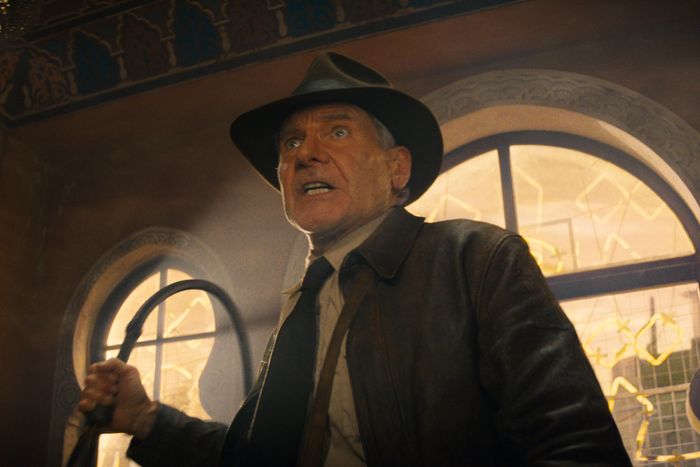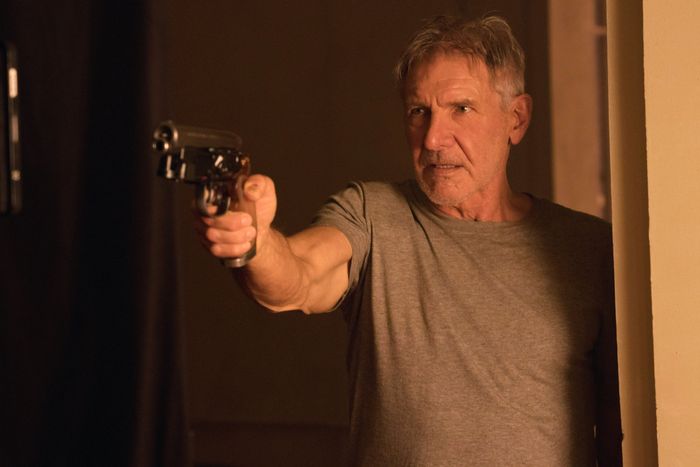
The best special effect in Indiana Jones and the Dial of Destiny isn’t a stunt, an explosion, or a CGI re-creation of another time. It’s the sight of Harrison Ford being overcome with emotion. It happens several times in the film, which — like director James Mangold’s other meditation on aging heroes, Logan — is about older people reluctantly admitting that their once-indestructible bodies are crumbling, that there’s more life behind them than ahead, and their failures are so numerous that they can’t even be tallied up, much less atoned for.
One such moment finds Indy, now a depressed, 70-year-old, newly retired professor and international fugitive, standing on the deck of a boat with his goddaughter and partner-in-adventure Helena Shaw (Phoebe Waller-Bridge). Helena asks Indy what he would do if he could go back in time and change one thing. He says he would prevent his son Mutt, who died in Vietnam, from enlisting, a tragedy that led to the collapse of his marriage to the great love of his life, Marion Ravenwood (Karen Allen). Ford plays the first part of the moment turned partly away from the camera. It was a wise decision: The sound of his rumbling baritone voice fragmenting with sorrow is so affecting that if he’d played the whole scene head-on, the film might not have recovered.
He does it again near the end of the film, when Indy is given a chance to enter history itself via time travel and literally live in the past — something he’s been figuratively doing by fixating on his mistakes and losses, and hiding from the people that he associates with them. When Indy admits he wishes to stay in the past, there’s a desperation and brokenness to Ford’s delivery. It reminded me of visiting my grandfather in a retirement home and hearing his voice break as he said that he wished he could be 20 again, before the Depression, the war, and decades in an emotionally abusive marriage ground him down. He wanted to have a young face and body again, but mostly he wanted to remember what it felt like not to have the tragic knowledge he’d gained over time. In Dial of Destiny’s coda, Indy wakes up again in the present, like Dorothy in The Wizard of Oz, and he and Marion sit down for a quiet exchange, each seemingly now willing to work through their problems. The takeaway, perhaps, is that it’s braver to face reality head-on than try to escape it. The sentiment retroactively seizes a five-chapter pulp-fantasy series in which lost Arks disintegrate Nazis and 800-year-old Grail Knights wave farewell from ancient tombs and grounds it in the cold facts of time, age, and mortality. It’s powerful.
Ford’s long career earns a lot of adjectives, but “powerful” isn’t the first that springs to mind. He never seemed intent on knocking viewers over with emotional force. The last 15 years of Ford’s career, however, have been distinguished by cracks-in-the-monument moments, in which tough, accomplished men let us see what a mess they are inside, rather than continue to hide it with pride and bluster. It’s impressive because these moments seem to come from an authentic place, and because Ford is like this now in project after project: emotionally transparent, vulnerable, unafraid — not of physical injury, because Ford was always great at communicating that fear, but of having his deepest, most anguished self on display for the other characters and his audience to scrutinize.
From his breakthrough as Han Solo in the original Star Wars through his box-office heyday in the ’80s and ’90s, Ford was a leading man who checked most of the boxes and then some. He had astonishing physical control — remember the way Indiana Jones’s knees cartoonishly buckle in Raiders of the Lost Ark after a Nazi strongman clocks him? And he was convincing as a man hopelessly intoxicated by a woman (see the original Blade Runner, Witness, Working Girl, Sabrina, and, in a way, The Fugitive), a feat that Robert De Niro, to name just one of Ford’s more respected contemporaries, has never done convincingly unless stalking was involved. But Ford let us feel when his heroes were in over their heads, too, or flat-out scared to die, and it helped convince audiences that one of the handsomest and most physically assured men ever to step in front of a lens was just a regular Joe.
All that said, a big part of what made Ford special was the way he underplayed everything, including outwardly “big” moments. He often withheld obvious signifiers of emotionality so that the little glimpses he did give you felt like piercing anomalies. (See: the expression of absolute gratitude on Indy’s face in The Temple of Doom when the voodoo potion wears off and he hugs his rescuer Short Round.) The actor is bringing the same understated directness to the most recent phase of his career. The stakes tend to be more internalized and personal, because they’re about grappling with what already happened in the Ford character’s life. He not only encourages us to share the characters’ regret, alienation, and sadness, he treats these feelings as a brittle core around which fantastic visions can be wound.
Ford has been doing what Clint Eastwood gets a lot more credit for but doesn’t do anywhere near as consistently or with as much simplicity and force. His brand now — you could even say it’s his calling — is to embed ordinary but universal anxieties about age and the certainty of death into the kinds of glossy mainstream productions that more often validate viewers’ fantasies of being the bosses of their own fate. Big-budget adventures, fantasies, and science-fiction films have cast him as familiar heroes (often ones he’s already played) adrift in a world that doesn’t care what they want or need. These men are often devastated by events that transpired a long time ago — ones they were at least partially responsible for, and that landed them in the melancholy, borderline impotent predicaments they’re in now.
This comes through most strongly in the three legacy characters Ford has revisited later in life: Indiana Jones, Star Wars’ Han Solo, and Blade Runner’s Rick Deckard. All three are loners hiding from themselves, their existences defined by regret and loss. In the Disney Star Wars sequel The Force Awakens, Ford’s space pirate turned stalwart rebel has gone back to scuttling around the fringes of intergalactic smuggling. The more time we spend with the character, the more we realize that he’s distracting himself from obsessing over the failure of his relationship with Princess Leia (Carrie Fisher) and his shame over their son Ben (Adam Driver) turning to evil. (Both Indy and Han’s marriages fell apart because they were emotionally incapable of giving their partners the support they needed after losing a son — figuratively in The Force Awakens, literally in Dial of Destiny.) Solo, introduced in the 1977 original as a Humphrey Bogart–style cynical materialist who turns idealist when circumstances demand it, dies because of that very same capacity for optimism. He embraces Ben on a catwalk, hoping to use fatherly love to turn his son back toward goodness, and gets a lightsaber through the gut for his trouble. The look of agonized disappointment on Ford’s face as Han dies is more wrenching than the character’s plunge to oblivion. It’s the death of an illusion.
In Blade Runner 2049, meanwhile, Ford’s former replicant hunter Rick Deckard is now a hermit living in an abandoned casino in a radiation-poisoned Las Vegas, a purgatorial landscape that mirrors his ruination after losing his great love, the android Rachel (Sean Young). The peak of the performance is when a corporate overlord (Jared Leto) gifts Deckard with a “new” Rachel. Ford’s face maps Deckard’s tragic progression from wonder and anticipation at this promised reunion to disgust and regret at having to accept that this Rachel is only a simulation, and the real thing can never return.
Even some of the lesser films Ford’s done since hitting retirement age show him leaning into melancholy and, at key points, falling into an abyss of despair. The role that’s taken Ford deeper into an old man’s sadness than any other to date is in a lesser-seen, perhaps surprising film: The Age of Adaline, a Blake Lively vehicle about an ageless woman who has to keep abandoning relationships before her community can figure out her secret. Ford plays William, who is happily married (to Kathy Baker) but goes to pieces after recognizing Adaline as the long-lost great love of his life. The younger incarnation of Ford the movie star rarely presented himself this way. His characters’ emotional pressure points were usually hidden beneath a carapace of patriarchal authority and unexamined entitlement: They were either the bosses of others or one-man islands. And while they sometimes (briefly) broke down, they rarely fell apart.
Ford’s work in Adaline ranks with his very best and foregrounds a truth about some of his iconic earlier characters that people joke about but tend not to examine closely: Han Solo, Indiana Jones, and Rick Deckard have all the outward hallmarks of a tough, capable, self-actualized hero, but like most of us, were more often acted upon by events than capable of controlling them. Ford excels at playing action heroes swept away by forces larger than any one person, group, or nation. They don’t so much direct the waves of action as ride them.
His two Jack Ryan movies end with Ryan defeating specific villains without changing the corrupt institutions that enfold them, because that would be impossible. Han Solo gets pulled into the rebellion, sticks around, leaves it, gets pulled back in, leaves it again, and so on; he’s important to its success, but he’s just one small part, and he spends a lot of his time trying not to get tied down to it. Every Indiana Jones film ends with Indy witnessing a miracle that then passes, returning him to ordinary life. Both Blade Runner movies center on police officers who are overwhelmed by conspiracies, corporate skullduggery, and the city’s endless scope. In the first Blade Runner, Deckard can only save Rachel because he’s already been saved by another android, his quarry Roy Batty, who broke his fingers and let him dangle from a ledge before deciding to pull him up and let him live. In the second Blade Runner, Deckard is saved from drowning by another android, Ryan Gosling’s K, who then dies reuniting Deckard with the daughter he’d never met. Ford’s action-hero filmography is more about survival than winning. It’s about existing within limits and sneaking a little bit of goodness into a ruined world. For all their righteous fearlessness and kinetic daring, the Ford hero is, to quote a line from The Last Crusade, as human as the next man. There’s only so much he can do.
This was the subtext of Ford’s career in his 30s, 40s, and 50s. But the older Ford hero excavates this idea, polishes it up, and foregrounds it. It was a timepiece all along. The clock is running out for Indy, for Ford, for all of us. That’s why it’s so right that Dial of Destiny focuses on time and the yearning to roll it back and redo history, or just start again in a place where no one knows you. Even if such things could happen, the script implies, they shouldn’t. Ford is the weathered face of this truth.



